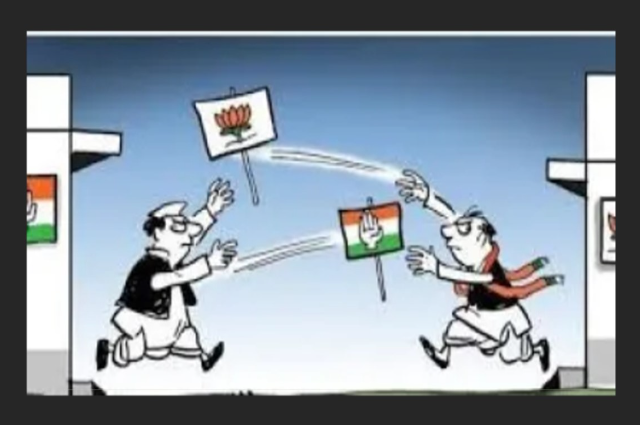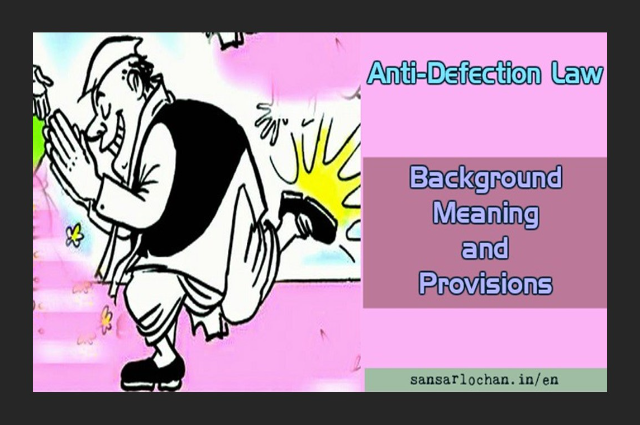INTRODUCTION

The Anti-Defection Law recently came into the limelight after the declaration of candidature of Swapan Dasgupta, a nominated member of the Upper House of the Parliament, from the Tarakeshwar constituency by the Bhartiya Janata Party, in the poll-bound state of West Bengal. After much furore by the Opposition Parties citing the 10th Schedule of the Constitution (colloquially also called as the Anti-Defection Law) that inter-alia provides that an independent nominated member is precluded from becoming a member of the Political Party, he eventually had to tender his resignation from the house. This is not the first instance of political amorality. Before this, the brazen instance of portrayal of this corrupt practice was witnessed in the state of Madhya Pradesh wherein only after 15 months of the formation of the Government in the state, 22 M.L.As of the Indian National Congress resigned from the membership of the Legislative Assembly in March 2020, paving way for the Bhartiya Janta Party to assume power in the state.
The Anti defection Law was passed in 1985 in order to prevent the politicians from indulging in corruption and frequently changing the parties. But, over the time, politicians have founded loopholes and used it for their own gains, especially for the cravenness of seats and preserving the party ambitions. It has been realized that the anti-defection law has not been effective to maintain the parliamentary discipline, and has resulted into rampant horse trading and systematic disintegration of democracy.
PROVISIONS OF Xth SCHEDULE AND UNDERLYING CRITICISM
1. On Mergers and Splits- Paragraph 3 of the Xth Schedule originally provided that disqualification shall not apply if 1/3rd of the party members split i.e. they leave the political party. In the same way, Paragraph 4 provides that the disqualification shall not apply if 2/3rd of the members merge with the other party. The Paragraph 3 of the Xth Schedule was highly denounced and condemned as it was egregiously misutilized and caused multifold divisions in the parties. It was finally removed by the 91st Amendment, 2003. But, the nodus still remains with Paragraph 4 because it does not attack mass split and rather attacks an individual split. It has come into the public eye that the reason for both the collective and individual split is more and less the same i.e. the longing for the office. K.N. Singh has said apropos of the Paragraph 4 that the “law punishes small fry, but not hawks.”

2. Unrestrained Powers to the Speaker/ Chairman
- Paragraph 6 gives wide powers to the Speaker/Chairman to decide on the question of disqualification of any member. The Speaker is not allowed to serve his political affiliations after being elected. Such broad decision making power in the hands of Speaker/ Chairman is deleterious because, by giving such vast powers, the Speaker may not exercise neutrality while deciding the disqualification dispute. It is a big hurdle to the Xth schedule and undermines its intent.
3. Curtailment of Dissenting Opinion- The most flagrant subject is the Paragraph 2(1)(b) which says that the member of a House shall be disqualified if he votes contrary to the decisions and directives of the parties. A serious consideration and action should be taken on this paragraph because voicing opinion is the required feature of true democracy. The active participation can only be ensured when a person is free to put his approach, reasoning and ideas towards a particular issue. The SC in Kihoto Hollohan v Zachillhu 1992 SCR (1) 686 said that the violation of any directives by the whip, which may result into disqualification should only be on the issues, which are of utmost importance and integral to the party, like a vote on the motion of no-confidence. A clear ‘lakshmanrekha’ needs to be drawn between the word ‘defection’ and ‘dissent.’ Furthermore, Article 105 gives special powers and privileges to the members of Parliament and immunes them from any proceedings in the court on the basis of parliamentary behavior. They are given the right of free voting. There can be healthy debate only when the parliamentarians are not forced to vote and comply with the party guidelines.
POSSIBLE SOLUTIONS
One of the most famous broad-based approach is adopted by U.S. to give liberty to its legislators, which says that the legislators are free to vote on any policy issue. The issue first came into notice in Bond V Floyd. In this case, several anti-Vietnam remarks were made by the legislator Julian Bond, who was then disqualified from the house on the grounds of violation of constitutional oath. The Supreme Court of U.S. opined that the legislators have the right to put their view and take a stand on contentious issues. The 1st Amendment of U.S. Constitution gives the right to freedom of speech. Moreover, the 1stAmendment also in that sense gave the freedom of speech on the political matters to the legislators. In India, we should embrace this approach because public welfare can only be ensured when leverage is granted to the legislators to take any stand they believe in. This is also seen in British Parliament, where there is no specified law related to defection. Edmund Burke’s justification is very well understood by his quote which says that “your representation owes you, not his industry only, but his judgement; and he betrays, instead of serving you, if he sacrifices it to your opinion.”
Apart from these approaches, there are some approaches which we can adopt on our own and reform the laws. As pointed out by Justice R.F. Nariman in the recent Manipur Assembly case, the first conundrum is the power vested in the hands of the Speaker, which should be wiped out and an independent tribunal should be formed to decide these cases.
CONCLUSION
The Anti-Defection Law, when implemented, was perceived as a great step towards promoting parliamentary discipline and sound atmosphere for the parliamentarians. The sole purpose of the Act was to work in integrity without defying the party and espouse the balance between the rights of an individual member and the rights of the party, as a whole. But somewhere this law has many drawbacks and has led to the construction of disloyalty, corruption and craving for seats.
REFERENCES
- Vibhor Relhan, 'Anti-Defection Law Explained', PRS LEGISLATIVE RESEARCH, Dec. 6, 2017, (Last visited on Sept. 5, 2021)
- Pranav Gosein and Shrieya Gosein, 'Anti-Defection Law in India and intriacies concerning it', Vol. 7, International Journal of Current Advanced Research', (Last visited on Sept. 6, 2021)
- Kartik Khanna and Dhvani Shah, 'Anti-Defection Law: A Death Knell for Parliamentary Dissent', (Last visited on Sept. 6, 2021)
